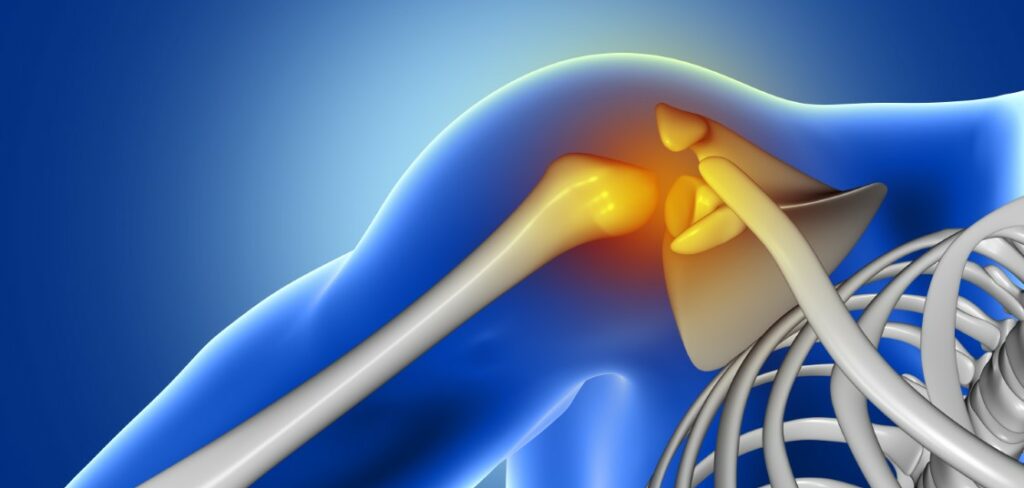Frozen Shoulder treatment in Kerala, India

Adhesive capsulitis sometimes called frozen shoulder is a disease of the shoulder joint characterized by pain and stiffness. This is very common in people with diabetes and dyslipidemia, thyroid dysfunctions but other than that it is common in those who keep the joint immobilized for a longer period of time. The reason behind this is thought to be the formation of the scar tissue which thickens the shoulder joint capsule eventually leaving no space for movement. It is very common after fracture or dislocation immobilization of the shoulder joint.
Frozen shoulder is more common in women than in men between 40 to 60 age group. The risk increases if you have an underlying disease condition like stroke, heart disease, thyroid, diabetes etc or if has undergone mastectomy.
Our rehabilitation teams
Our doctors work with healthcare professionals to evaluate the impact of injury on your function and develop a recovery plan that is personalised for you. Our rehabilitation teams include physiotherapists, occupational therapists, speech/language therapists, Acupuncturist, Ayurveda & Naturopathy doctors . We offer care for as long as you need it and advise you of techniques to recover faster.
Our hospital brings together specially trained medical staff, advanced monitoring techniques, and specialized Physiotherapy and Ayurvedic treatments focused on improving the outcomes of patients with Frozen shoulder.
Ayurvedic Treatment for Frozen Shoulder
Treatment we provide at Maurya Ayurveda includes internal medications, external therapies, which are mentioned in classics as treatment for frozen shoulders in ayurveda.
Ayurvedic treatment includes internal medications to reduce pain and inflammation. External therapies are very beneficial in reducing stiffness.
In Ayurveda frozen shoulder is correlated as apabahuka which is mentioned in vata vyadhi prakarana in which treatment includes reducing stiffness and restoring functions.
Ayurvedic remedy for frozen shoulder includes mainly drugs like prasaranyadi which is given as decoctions, ksheerapaka or in taila form.
Also, In Ayurveda frozen shoulder is related to both vishwachi or apabahuka as per symptoms. Sometimes these may be associated with greeva graham also. Sneha pana is also found beneficial to reduce vitiated vata dosha.
Physiotherapy Treatment for Frozen Shoulder
In the beginning very gentle shoulder movements, muscle releases, dry needling, and kinesiology taping for pain relief can help during this uncomfortable inflammation phase. It has been demonstrated that using a TENS machine can lessen pain and improve range of motion. The initial phase, also known as the painful, freezing Phase, should have pain relief as its main goal. Any painful activities should be avoided during this time. Patients who engaged in easy, pain-free exercise saw better outcomes than those who underwent extensive physical therapy.
In the second phase A quick return to function is achieved through the use of gentle and targeted shoulder joint mobilisation and stretches, muscle release techniques, acupuncture, dry needling, and exercises to regain your range of motion and strength. It’s important to exercise caution when introducing any overly aggressive exercises. Stretching exercises by themselves don’t seem to be as effective as mobilisation with movement (MWM) style techniques.
Give you exercise progressions, including strengthening exercises, to help you maintain and control your newfound range of motion.
During this thawing phase i.e.; the third phase, physical therapy is most effective. Stretching intensity was kept constant while frequency and duration were increased as tolerated by the patient. It is possible to hold the stretch for longer periods of time and hold more sessions each day. More strenuous stretching exercises and pulley exercises can be performed to affect tissue remodelling as the patient’s level of irritability decreases.
Yoga for Frozen Shoulder
In addition to the modern sedentary lifestyle, involving sitting at a desk all day, much of the tightness and blockage in the shoulder region comes from anxiety and negative emotions stored here.
Yes, no doubt yoga asanas (poses) can be beneficial to open and release tension in these muscles – not only in the shoulder area, but also in the chest and upper back areas. Tightness in the upper chest causes the shoulders to hunch, and weakens these muscles. Yoga can help prevent the slumping of the spine by lengthening it, for an overall better posture.
Yoga should be used as a preventive measure, rather than a curative one. Yoga asanas can help strengthen or stretch your muscles in the shoulder, neck and upper back region. It is best to expect results from yoga for frozen shoulder pain, over a period of time, and under the guidance of our experienced yoga doctor , as the suggested postures must cater to your problem specifically.
Symptoms and Stages of Frozen Shoulder
Symptoms mainly include pain associated with stiffness that develops gradually which makes the movements difficult. Muscles that wrap the joint will be stiff and movements restricted. Typically there are three phases of frozen shoulder and each phase has distinctive symptoms.
- Freezing stage: Pain persists at times when the patient moves the joint. The pain hurts and gets worse at night. This lasts for a period of 6 to 9 months.
- Frozen stage: Pain sometimes might get better but stiffness worsens. Shoulder movements become very difficult and it becomes harder to get through daily activities. This stage can last for about 4 to 12 months.
- Thawing stage: This is a recovery phase. The range of motion starts to get normal and stiffness reduces. This stage can last from 6 months to 2 years
Frequently Asked Questions !
In advanced cases there is no cure for Cerebral atrophy, but the associated disabilities can be managed by Ayurveda treatments, occupational therapy and physiotherapy. Our ultimate goal in such cases will be to prevent progress of the condition.
CT and MRI are done mainly to diagnose the condition, but MRI is more precise and sensitive in detecting even the mild focal lesions and the atrophic changes in the nuclei.


